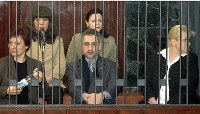Libya's Supreme Court to rule in appeal of five Bulgarian nurses and Palestinian doctor
Libya's Supreme Court will rule on July 11 in the appeal of five Bulgarian nurses and a Palestinian doctor convicted and sentenced to death on charges of infecting about 400 Libyan children with the AIDS virus.

The ruling is the latest stage in an eight-year case that has become a sticking point in Libya's drive to improve ties with the United States and Europe, which demand the medics' release. At the same time, it has stirred up anger at home, where many demand their execution.
The prosecution insists that the six infected the children intentionally in experiments to find a cure for AIDS. Defense experts testified that the children were infected by unhygienic hospital conditions. In their testimony, the workers said the confessions used by the prosecution had been extracted under torture. Several of the nurses have said they were also raped to force confessions.
U.S. President George W. Bush last week called for the six to be freed. During the course of the trial, the United States restored diplomatic ties with Libya after Tripoli resolved the dispute over the 1988 Pan Am bombing over Lockerbie, Scotland and renounced its weapons of mass destruction program. But the Bulgarian case has been one factor preventing warmer ties between the two countries.
If the Supreme Court upholds the convictions and sentences, it is not necessarily the final word. Its decision to uphold would then go to Libya's Supreme Judicial Council, which could approve the verdict, annul the conviction or set a lighter sentence.
Presiding judge Fathi Dahan announced the verdict date at a session in Tripoli on Wednesday, after four hours of final arguments from lawyers for the defense and for families of the infected children. The state prosecutor called on the court to uphold the death sentences.
The nurses and the doctor were not present at the session, which was attended by ambassadors from several European countries.
The judge refused a prosecution motion that an announcement from the Bulgarian government that the Palestinian doctor had been granted Bulgarian citizenship be used as evidence against him.
Bulgaria announced Tuesday that the doctor, Ashraf al-Hazouz, had applied for citizenship several years ago and that the procedures for his acceptance were completed last week.
The six began working at the Benghazi hospital in March 1998. The following year they were arrested after more than 400 children there contracted the HIV virus. Fifty of the children have since died.
During their trial in 2004, Luc Montagnier the French doctor who was a co-discoverer of HIV testified that the HIV virus was active in the hospital before the Bulgarian nurses began their contracts there in 1998. Still, they were convicted and sentenced to death.
After an international outcry over the verdicts, the Supreme Court ordered a retrial.
But in a ruling that shocked many in Europe, the second trial issued the same verdict in December despite a scientific report that emerged weeks earlier that analyzed samples of the virus found in the children and confirmed the virus was contracted as early as 1995.
Libyan leader Moammar Gadhafi has tried to reach a deal by which Bulgaria would compensate the victims, a proposal Sofia has rejected, saying it would imply the nurses' guilt.
Several of the nurses have said they were raped and tortured to force confessions. Two Libyans a police officer and a doctor were put on trial on charges of torturing them and were later acquitted which led to the six medics being put on a new trial for defamation.
They were acquitted of defamation in late May, a ruling that raised hopes in Bulgaria that the main conviction and death sentences against them could be overturned by the Supreme Court.
Subscribe to Pravda.Ru Telegram channel, Facebook, RSS!





